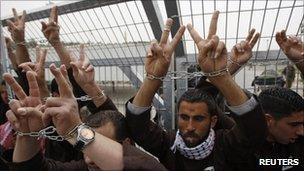Israeli treatment of hunger strikers 'appals' UN expert
- Published

A UN expert has said he is appalled by the "continuing human rights violations in Israeli prisons", as Palestinian inmates continue a mass hunger strike.
Special Rapporteur Richard Falk said Israel had to treat hunger strikers in line with international standards.
Israel's Prison Service says some 1,550 Palestinians in jail are on strike.
Doctors have expressed serious concern about two men who have been refusing food for 63 days in protest at being detained without charge or trial.
The Israeli group, Physicians for Human Rights (PHR), is pressing for Bilal Diab and Thaer Halahla to be transferred to a civilian hospital, saying their lives are now "endangered".
A PHR doctor examined them at the Ramle prison clinic, near Tel Aviv, on Monday. She found that both were not receiving adequate medical care.
"Both have stopped co-operating in any way with the Israeli Prison Service doctors. They are not taking vitamins or salts on the IV [intravenous] drip," PHR spokeswoman Amani Dayif told the BBC.
"Bilal is only drinking water, less than a litre per day. He's in danger of cardiac arrest. There are signs that Thaer might have an infection in his lung. Both should be transferred to a proper hospital and need constant monitoring," she warned.
Mr Diab was moved to a hospital after fainting on Tuesday and PHR said he should stay there.
'Satisfactory condition'
Mr Diab, 27, has been detained since August, while Mr Hahalha, who is 34, has been held since June 2010.
They are among 300 inmates in so-called "administrative detention", a practice which allows the Israeli authorities to hold them without charge or trial for renewable periods of up to six months at a time.
A total of six Palestinians in administrative detention are on extended hunger strikes, according to PHR.
Other Palestinian prisoners in Israeli jails began hunger strikes in solidarity on 17 April. They are also demanding better conditions and more visits from their lawyers and families.
In recent days, rallies have been taking place in support of those on hunger strike.
There were clashes between Israeli security forces and dozens of Palestinian protesters outside Ofer military prison, near the West Bank town of Ramallah, on Tuesday. Demonstrations were also held in Nablus and Gaza City and more are planned in the coming days.
Earlier this week, Palestinian political leaders, including Palestinian Authority President Mahmoud Abbas, who leads the Fatah movement, and Khaled Meshaal, political chief of the rival Hamas faction, said they planned to take the prisoners issue to the UN.
The militant group, Islamic Jihad, meanwhile warned of reprisal attacks if any of the prisoners died.
The latest statement by the Israeli Prison Service (IPS) said that "all of those on hunger strike are drinking water and have a satisfactory health condition."
"In general, they are kept in different blocks from those not on strike, and different privileges are kept from them like visits and electrical appliances like televisions are withheld."
But Mr Falk, the UN special rapporteur on the situation of human rights in the occupied Palestinian territories, criticised the "punitive measures" , which he said also included placing them in solitary confinement.
"I am appalled by the continuing human rights violations in Israeli prisons and I urge the government of Israel to respect its international human rights obligations towards all Palestinian prisoners," he said. "Israel must treat those prisoners on hunger strike in accordance with international standards, including by allowing the detainees visits."
He added: "Detainees must be able to effectively challenge administrative detention orders, including by ensuring that lawyers have full access to the evidence on which the order was issued."
The Israeli military says it uses administrative detention when it fears an immediate risk to security or to protect informants. It has not commented on the hunger strikes.
The UN estimates that since the 1967 Middle East war, over 700,000 Palestinians have gone through detention in Israeli jails. There are currently about 4,500 Palestinians in Israeli prisons.
According to the IPS, a panel was set up before the mass hunger strike began to look into prisoners' demands and its draft report is due soon.
Reports say that the head of the IPS met Palestinian prisoners, including the jailed Fatah leader Marwan Barghouti, at the weekend.